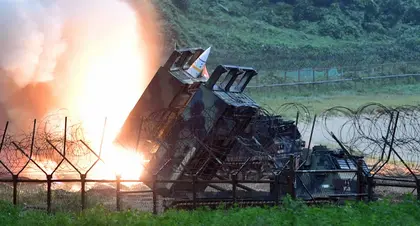Latvia said it had dispatched a warship on Sunday after damage to a fiber optic cable to Sweden that may have been “due to external factors.”
The Latvian navy said it had identified a “suspect vessel,” the Michalis San, which was near the location of the incident along with two other ships.
JOIN US ON TELEGRAM
Follow our coverage of the war on the @Kyivpost_official.
“We have a warship patrolling the Baltic Sea around the clock every day and night, allowing us to quickly dispatch it once we learnt about the damage,” Latvian navy commander Maris Polencs said at a briefing on Sunday.
Finland, Sweden and other nations around the Baltic Sea have been bracing their defenses due to a spate of suspected acts of sabotage to undersea cables in recent months.
Sweden sent 550 troops from one of its mechanized infantry battalions to Riga, , on Saturday to join a Canadian-led multinational brigade on NATO’s eastern flank.
Latvian Prime Minister Evika Silina said: “We have notified the Swedish authorities and are working together with them to assess the damage and its reason.”
Swedish Prime Minister Ulf Kristersson said he had been in contact with Silina during the day, AFP reported.
“There is information suggesting that at least one data cable between Sweden and Latvia has been damaged in the Baltic Sea. The cable is owned by a Latvian entity,” he posted on X.
After several telecom and power cables were severed in past months experts and politicians accused Russia of moving into a kinetic phase of their hybrid war against the collective West, which Moscow sees as Ukraine’s ally and sponsor.

Lukashenko Extends Three-Decade Belarus Rule, West Denounces Vote
In late December 2024, the Eagle S, a Russia-linked tanker suspected of damaging an underwater electricity cable on Christmas Day, was discovered to be kitted out with special transmitting and receiving devices used to monitor naval activity, according to Michelle Wiese Bockmann, an analyst for Lloyd’s List, citing a source with direct involvement in the ship. The vessel was subsequently detained by Finnish police.
NATO earlier this month announced it was launching a new monitoring mission in the Baltic Sea involving patrol ships and aircraft, aimed at deterring any attempts to target undersea infrastructure in the region.
The damage occurred in Swedish territorial waters at a depth of at least 50 meters, officials said.
The cable belongs to Latvia’s state radio and television center (LVRTC) which said in a statement that there had been “disruptions in data transmission services.”
LVRTC said alternatives had been found and end users would mostly not been affected although “there may be delays in data transmission speeds.”
“Based on current findings, it is presumed that the cable is significantly damaged due to external factors. LVRTC has initiated criminal procedural actions,” the company statement said.
Debate has arisen as to the cause of the cable cuts.
Three incidents over the past 18 months that saw vessels damaging undersea cables and gas pipelines in Europe – some by dragging anchors on seabeds – have led to suspicions that the Kremlin was to blame for the damages, especially against the backdrop of Russia’s alleged hybrid war against Europe using arson and explosions, according to Western agencies.
However, US intelligence officials told the Washington Post that intercepted communications and other classified material available to the investigators suggest the damages were caused by inexperienced crews serving aging vessels, with no evidence pointing towards Russian involvement.
Against that backdrop, the Washington Post reported, the damage to seabed systems added to a European sense of being under siege. German Defense Minister Boris Pistorius called another anchor-dragging incident in November “sabotage” and said that “nobody believes that these cables were accidentally severed.”
Weeks later, Finnish President Alexander Stubb said a Christmas Day incident was “definitely” linked to Russia.
You can also highlight the text and press Ctrl + Enter










